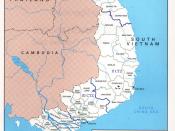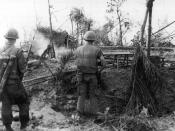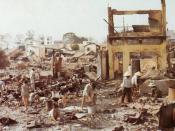The Vietnam War
The United States made the right decision in joining the war efforts of the South Vietnamese. The only mistake was that the U.S. should have done everything in its power to win the war as quickly as possible. The U.S. was obligated by the Truman Doctrine to contain communism. Truly the best way to contain it would be
to defeat it.
This war was a person changing experience. With all the horrible pain and
gore the soldiers had to see and endure, they could never be the people they once
were. Supporters and protesters back in the U.S. were causing chaos. The Doves
and the Hawks, the Doves against the war and the Hawks supporting the war,
divided a country. In the face of death, the brave men of the military of the United
States fought on to make the world a little better for everyone.
The United States had a clear advantage. Their military, weaponry, and
combat skills were superior. If not for the North Vietnamese knowledge of the
terrain and guerrilla tactics, the war would have possibly been a short one.
However, the U.S. government only sent what they felt to be adequate manpower to
contain communism, not to defeat it. They wanted to keep the loss of lives down, and
keep the Doves as happy as possible. If only they had sent a massive force into
enemy territory, they could have bombed the North Vietnamese thoroughly and
invaded their country with extreme force. This would have the potential to end the
war more quickly and save American lives, and the success of the victory.
The Truman Doctrine was first set forth by United States President Harry S.
Truman in 1947. The immediate objective of the policy was to send U.S. aid to
anti-Communist forces in Greece and Turkey, but it was later expanded to justify
support for any nation that the United States government believed was threatened
by Communism during the Cold War period, in this case, the Vietnam War.
The Vietnam War took its toll on the American soldiers. When they returned
home, they were different people. They didn't look the same, they didn't act the
same, they weren't the same. Some could not hold on to their sanity in light of what
they had seen and been through. In order to take the soldiers minds off the horrors
all around them the U.S. command brought in boatloads of toys for the men to play
with, everything from go-carts to violins. There was surfing, sailing, and miniature
golfing. Almost everyone got a chance to spend a day or two at the beach pretending
that he wasn't in Vietnam. Large bases had Olympic size swimming pools and
air-conditioned libraries, softball fields, and basketball courts. Even the toughest of
bases had a net and a volleyball.1
The men also tried their best to keep their minds off the war. A soldier could
requisition from Special Services enough musical instruments to form a band or
maybe the army band would entertain. If they were too far out in the boonies, with
a little ingenuity and a few raw materials a man could rig up a washtub bass and
make his own music. In the earlier days of the war, U.S. military personnel on leave
in Saigon could put on civilian clothes and play tourist. Even after the 1968
attacks it was possible to enjoy sightseeing, shopping, and carousing in Saigon, but
the city was a much more tense place.
In the early day it was also fairly common for American serviceman to live in
civilian housing, often with a Vietnamese girlfriend. After the Tet Offensive, (the
attack on Saigon, the capital of South Vietnam, and some provincial capitals by
Communist troops on January 30, 1968.) this was largely prohibited, but some
servicemen managed to continue the arrangement with the tacit approval of their
superiors. Near the big Tan Son Nhut air base there was a street known as "Soul
Alley" where a number of black soldiers lived with Vietnamese women and
commuted to their jobs on the base.
The war was taking so long because the U.S. was only trying to contain the
enemy, the soldiers needed something to improve moral. One of the major American
imports to Vietnam was the visiting celebrity. The stars would be fitted with jungle
fatigues, briefed by the brass, and flown all around the country to visit firebases and
hospitals where they would shake hands, sign autographs, and pose for pictures, all
in the interest of boosting morale. Often a military photographer would be assigned
to cover the celebrity's visit, and the star would get to keep the pictures for stateside
promotional purposes.
The star of stars was Bob Hope, and his show was the act of acts.
Amphitheatres were built at major bases for the Bob Hope Show and Hope was
guaranteed a full house. Most GIs wanted to see the show, of course, but to erase
any doubt about the seats being filled units were required to send certain amounts of
men to the show. For a grunt in the field, getting a day off the be flown out of the
bush for the Bob Hope Show was a big deal. Since not everyone in the unit could go
there were sometimes drawings of competitions to select the lucky ones. Sometimes
the competitions were based on body counts: The soldier who was credited with the
most kills was rewarded with a ticker to the show.1 Between 1965 and 1967, both the
United States and North Vietnam had fought to a highly destructive draw. The U.S.
bombing of North Vietnam caused tremendous damage, but it did not affect the
enemy's willingness of ability to continue fighting. North Vietnam kept its most vital
resources hidden, and the Soviet Union and China helped make up the losses.2
American victories in ground battles in South Vietnam also failed to sharply
reduce the number of enemy troops there. The U.S. Army and Marines usually won
whenever they fought the enemy. But North Vietnam replaced its loses with new
troops. Its forces often avoided defeat by retreating into Laos and Cambodia.
As the war dragged on, it divided many Americans into so-called hawks and
doves. The hawks supported the nation's fight against Communism. But they didn't
like Johnson's policy of slow gradual troop increases and urged a decisive defeat of
North Vietnam. Clearly the right thing to do. The doves opposed U.S. involvement
and held mass protests. Many doves believed that U.S. security was not at risk.
Others charged that the nation was supporting corrupt, undemocratic, and
unpopular governments in South Vietnam.
The growing costs of the war, however, probably did more to arouse public
uneasiness than the antiwar movement did. The war cost ate up nearly a fifth of our
nation budget-a rate of two billion dollare a month.F By late 1967, increased
casualties and Johnson's request for new taxes helped produce a sharp drop on
public support for the war.1
North Vietnam and the Viet Cong turned a new page of the war on January
30, 1968, when they attacked major cities of South Vietnam. The fighting was
especially savage in Saigon, the capitol of South Vietnam, and in Hue. This
campaign began at the start of Tet , the Vietnamese New Year celebration. It came
to be known as the Tet Offensive.
As a military strategy, the plan was flawed. The United States and South
Vietnam quickly recovered their early losses, and the enemy suffered an enormous
amount of casualties. But the Tet attacks shocked the American people. The United
States had about 500,000 troops in South Vietnam, and U.S. leaders had reported
strong winnings just a short time before. Many Americans wondered whether
blocking Communist growth was worth the loss in lives and money. The government
should have just defeated the Communists altogether.
The Tet offensive forced basic changes in Johnson's policies. The President
cut back the bombing of North Vietnam and rejected Westmoreland's request for
206,000 additional troops. Johnson also called for peace negotiations and declared
that he would not seek reelection in 1968. Peace talks began in Paris in May.
Opposition to the war in the United States grew quickly during Nixion's
presidency. Some opposition developed as a result of television coverage of the war,
which brought scenes of war horrors in millions of homes.
In March 1971, the conviction of Lieutenant William L. Calley, Jr., for war
crimes raised some of the main moral issues of the conflict. Calley's Army unit had
massacred at least 100 and maybe as many and 200 civilians in 1968 in the hamlet of
My Lai in South Vietnam. Calley was found guilty of murder and was sentenced to
jail for 10 years. Some war critics used the trial to call attention to the large
numbers of killed by U.S. bombing and ground operations in South Vietnam. Other
pointed to the vast stretches of countryside that had been destroyed by bombing and
by spraying of chemicals. U.S. forces used such weedkillers as Agent Orange to
reveal Communist hiding places in the jungle and to destroy enemy food crops.
Public distrust began to grow on June 1971, when newspapers published a
secret government study of the war called The Pentagon Papers. The study raised
questions about decisions and secret actions of the government leaders regarding the
war.
In March 1972, North Vietnam began a full scale invasion of South Vietnam.
Nixon retaliated by restarting the bombing on North Vietnam. He also had
explosives planted in the Haiphong harbor, North Vietnam's major port for
importing military supplies. These things helped stop the invasion which was almost
to Saigon by August 1972.
The losses of both sides during the 1972 fighting lead to peace talks. A
cease-fire was reached and signed by all parties. American troops were evacuated
and all prisoners were returned. Soon the peace talks broke down and North
Vietnam began their invasion again. This time they were successful. South Vietnam
surrendered to North Vietnam in Saigon on April 30, 1975. Saigon was then
renamed Ho Chi Minh City.
The enemy's plan obviously worked. They got their main concern, the U.S.,
to withdraw and they knew that they probably would not return. Thousands of
South Vietnamese civilians fled with the soldiers during the invasion by the North.
Most died from either gun wounds or starvation. This all should have been avoided
at the beginning. The United States should have fought to win. In war there should
never be any half-way commitments.



Repetetive
You're paper was generaly alright, except you repeated some of your ideas rathere than combining them into one paragraph. At the beginning of your paper you describe the Hawks and Doves very briefly, but you then do the same thing later on nearer to the end of your essay. It would be much better to combine those ideas then to let them hang around in different paragraphs. You do the same thing with what the government should have done. You should have left your opinion in the introduction and in the closing paragraph. The middle body paragraphs are soley for providing reason for your opinion. Besides that, a pretty good overview of the events during the Vietnam War. Could include some more details, but as it was, not bad.
0 out of 0 people found this comment useful.